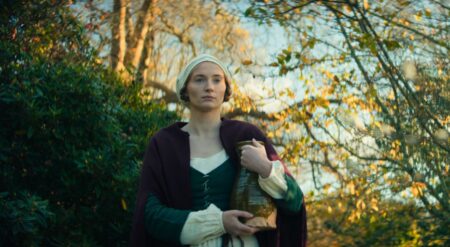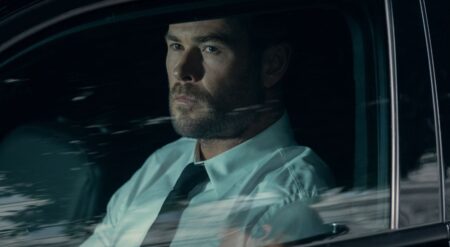Perhaps nothing has defined the American myth more than the outlaw. Since the end of the cowboy posse, no other collective has exemplified the free, rebellious American condition more than the biker gang. Most famously captured by photographer Danny Lyon, he lived among his leather-jacketed subjects for months, helping him capture images of outlaw life with rare flair and authenticity. His photo book serves as direct inspiration for Jeff Nichols’ The Bikeriders, but the film lacks the qualities that make Lyon’s work so revealing and genuine. Though its grand slice of late 60s Americana can often be too intoxicating to resist.
The Bikeriders unfolds as an account of the fictional motorbike gang known as The Vandals from 1965 to 1973. It’s framed around a conversation between Kathy (Jodie Comer), the girlfriend of the loyal and feisty Vandals member Benny (Austin Butler), and Lyon (Mike Faist) himself. She details the foibles and exploits of the gang before the rot sets in, tracing their evolution from brotherhood to full-fledged criminal ring. While Kathy’s segues and amusing accounts are not without merit, they’re mostly negligible. At times, they actively take away from the film’s attempts at sincerity and commentary, turning many members of the gang into caricatures whose ultimate motives are rendered cursory at best.
Kathy’s voice-over is just one symptom of how iterative the entire experience feels, unfolding as a milquetoast rendition of Goodfellas narrated by Henry Hill’s wife. Nichols fuels The Bikeriders with countless flashbacks, freeze frames, fourth-wall character introductions, and a bumping era-appropriate soundtrack à la Martin Scorsese. The effect gives us something that not only feels unoriginal but uninterested in rising above its influences to interrogate the social factors and historical contexts that fuelled the biker-outlaw lifestyle.
Though it’s clear that Nichols’s choice to bask in his inspirations is intentional, at one point depicting The Vandals’ formation as a result of their fearless leader Johnny (Tom Hardy) watching The Wild One, starring Marlon Brando. Yet, this sheer reliance on cinematic callbacks traps the film in second gear. Rarely does The Bikeriders feel like an authentic, voyeuristic gaze into the milieu of biker gangs, and more like a greatest hits compilation of American crime cinema. It’s especially unfortunate because Nichols has proven himself to be a deeply observant filmmaker, peeling back the layers of American mythmaking with efforts like Mud, Take Shelter, and Midnight Special.
With only a few references to its historical context— through Vietnam, Hippie culture, and some hilarious disdain for academic “pinkos”— there are very few elements grounding the film to its setting and a sense of authenticity. The Bikeriders often feels like rich people playing dress-up instead of anything remotely connected to the real world, where people struggle to cling to a liberating but dying mode of existence. Butler’s miscasting shoulders these glaring missteps, with his performance failing to rise above a string of feigned smouldering glares. Along with Comer’s forced, overcompensating Midwest accent, the emotional core of the film, centering on Kathy’s battle with Johnny over Benny’s loyalties, falls flat.
The rest of the supporting cast brings much-needed colour to the film. While Hardy is operating within his wheelhouse, he delivers real emotional poignancy with the more unsubtle coats painting his character. It especially pays off in a late scene, where he laments the loss of his Gang’s true purpose: “You can give everything to a thing, and it’s still gonna do what it’s gonna do.” Micheal Shannon’s Zipco, Norman Reedus’ Funny Sonny, and other eccentric supporting characters fill in The Bikerider’s otherwise dull tapestry with great vibrance.
Despite how much The Bikeriders falters, there’s no denying irresistibly classic sensibilities. Shot with wide, romantic lenses, it engrosses us in the shaggy, shabby, and sloppy dens its gang inhabits. At its most riveting, it doubles as a time-warp, with its lived-in production transporting us into the age of free spirits, bloody knuckles, and beautiful cigarette smoke. It becomes all too easy to luxuriate in its vision of a bygone world and tune out its superficialities.
If only Nichols’ enthralling countercultural vision was imbued with the same aura of sincerity and urgency as its source material. As it rides into the sunset, The Bikeriders reads as a pretty love letter that’s quick to seduce us but gives us little reason to stay once its true, dull colours are laid bare.
The Bikeriders is in theatres on June 21, 2024.
The Bikeriders
-
Rating - 6.5/106.5/10
TL;DR
As it rides into the sunset, The Bikeriders reads as a pretty love letter that’s quick to seduce us but gives us little reason to stay once its true, dull colours are laid bare.







